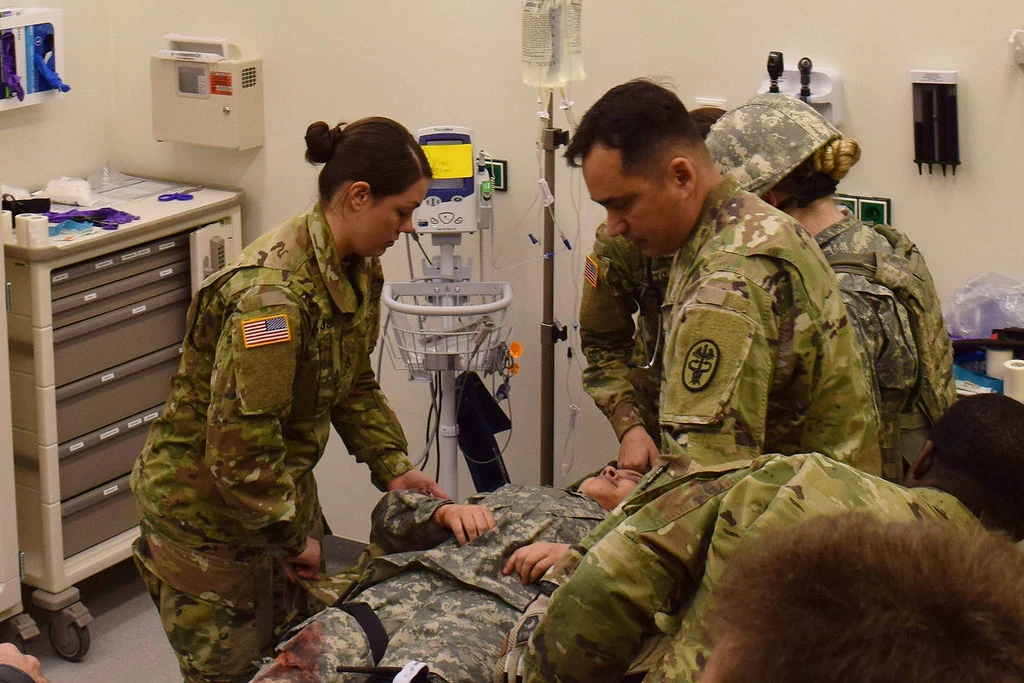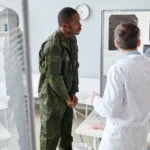How to Become a Military Doctor
A Military doctor receives medical training to treat members of the armed forces their relatives and former service members at the same time. Therefore, to perform their roles effectively they need a strong background in medicine plus military function expertise. However, their professionals need military preparation because their main work focuses on healthcare although they serve in war zones too.
Military doctors need to show defence tenacity while keeping a service-oriented focus. As a result, the health of military personnel and their unit readiness depend on military doctors performing their duties everywhere.
What Does a Military Doctor Do?
Military doctors work to protect the health and mental fitness of all servicemembers in their medical roles. Therefore, their work may include these medical tasks.
- Emergency trauma care: They manage trauma emergencies experienced by troops both during war and training.
- General medical care: Providing check-ups, preventive care, and vaccinations.
- Surgical procedures: Performing surgeries in field hospitals or military medical centres.
- Psychological support: Addressing mental health issues like PTSD and stress-related conditions.
- Medical research: Contributing to military medicine advancements in trauma care and disease prevention.
Furthermore, because of this military doctors need flexibility in their duties and need to excel under stress while working anywhere in the world.
Educational Path to Becoming a Military Doctor
Military doctors need extensive study at the medical level before beginning their service. Although this challenging path brings valuable rewards as both a medical professional and military member.
Undergraduate Education
Military doctors need to earn their undergraduate degree first in particular fields such as biology, chemistry or biomedical sciences.
- Biology
- Chemistry
- Biomedical Sciences
- Health Sciences
Students need impressive science grades plus they should join healthcare shadowing programs to advance their academic career in this subject. Students choose ROTC programs to begin experiencing life in military units before college ends.
Medical School
Doctors in the military need to study at medical schools for four years. Students may choose to study medicine at either private medical schools or military training institutions including
- The Uniformed Services University of the Health Sciences (USUHS) – Offers free tuition plus a military salary to students who provide service after graduation.
- Health Professions Scholarship Program (HPSP) – Covers tuition for civilian medical schools in exchange for military service after graduation.
The medical school curriculum includes:
- Preclinical training: Classroom-based education in anatomy, physiology, pathology, and pharmacology.
- Clinical rotations: Novice medical students do their training at real hospitals by treating patients throughout different medical areas.
Furthermore, undergraduate medical students in the military branch follow regular medical courses plus get specialized education in military field medicine.
Military Commissioning and Training
Military doctors need first to complete military officer training that introduces them to the military lifestyle through Basic Officer Training and Specialized Medical Training.
- Basic Officer Training: Introduces candidates to military customs, leadership, and physical fitness.
- Specialized Medical Training: Focuses on military-specific medical procedures, field medicine, and emergency response in combat zones.
Training length depends on which military branch you select but all programs teach basic military lifestyle and teach leadership skills above all else.
Residency and Specialization
Following medical school graduation military doctors need to enroll in a residency program lasting 3 to 7 years based on their selected specialty. Popular specializations include:
- Emergency Medicine – Critical for battlefield injuries.
- Surgery – Required for trauma and reconstructive procedures.
- Internal Medicine – Managing chronic diseases in service members.
- Psychiatry – Serves as the main tool to treat mental disorder symptoms in United States armed forces members.
Military medical training programs operate out of civilian medical centres linked with military institutions. Surely, the medical training doctors receive follows standard civilian guidelines but they need to prepare to deal with battlefield medicine at the same time.
Service Commitment
After graduation from residency, military doctors need to serve for 4 to 7 years, according to their commitment. They may be deployed to:
- Military bases worldwide
- Combat zones
- Humanitarian missions
- Naval ships or aircraft carriers
Indeed, doctors need to prepare themselves for service in challenging settings while treating patients under extreme pressure.
Military Medicine vs. Civilian Medicine
Doctors trained in medicine serve in separate medical fields because their workplace needs and job tasks remain distinct. Most civilian doctors practice medicine from hospitals and private clinics whereas military assignments are not part of their work responsibilities. In Contrast, military doctors must prepare to serve in military zones where they treat combat injuries and lead emergency healthcare during serious risks.
To deal with battlefield injuries doctors who serve in the military must receive further skills training in battlefield medicine and operational procedures. Their medical proficiency must coexist with military duties because they serve both as practising physicians and army officers in changing battleground environments. Despite being tough military medicine gives medical professionals experiences not found in normal civilian work.
Career Opportunities in Military Medicine
Despite the essential medical services military doctors provide to troops, the military offers additional career paths. Through their military service, doctors gain access to multiple paths including medical tasks in active duty units.
- Active-duty medical practice – Serving in hospitals, field units, or on deployment.
- Military medical research – Developing new treatments for battlefield injuries and diseases.
- Teaching and training – The Armed Forces use this role to educate medical students who will later become members of the military.
- Veterans‘ healthcare – The program provides healthcare services to former military employees before their retirement age.
Moreover, uniformed medical doctors find fulfilling work choices while serving and once their military promises end.
Post-Military Career Opportunities
Medical experience gathered through military work allows health professionals to transition smoothly into civilian medical careers. Additionally, after fulfilling their military service doctors can choose from many professional positions like independent practice hospital leadership or teaching medicine at academic institutions.
After handling critical battlefield injuries veterans may choose to work in trauma surgery emergency medicine or the veterans’ healthcare field. The military medical system seeks doctors who can handle stress-filled situations making these doctors top choices for top positions in healthcare organizations. After leaving military duty the professional abilities learned help the medical field survive and grow.
The Future of Military Medicine
Indeed, military medicine has long served healthcare needs yet improving medical technology changes how the field operates today. New healthcare technology such as electronic medical services and machine learning makes health services better for patients. The military needs its doctors to study new medical developments so they can give top-quality medical care to service members.
Conclusion
Military medical professionals enjoy both professional accomplishment and national service in their chosen profession. Further, the long rigorous medical education process leads people toward a one-of-a-kind way to protect their nation through medical work.
FAQs
What is a military doctor?
A military doctor works for the armed forces as a medical expert who treats personnel of the military as well as their families and veterans. These medical professionals treat injuries and illnesses as well as emergency cases throughout military healthcare facilities in different locations. Also, the position lets them join important medical trials plus perform volunteer services during humanitarian crises.
Which military branch offers the best chances for becoming a doctor?
All military branches provide medical service job paths to their members. The Army Medical Corps gives doctors wide medical choices with training at different stations while the Navy Medical Corps allows doctors to work both on ships and Marine units. The Air Force Medical Service specializes in both aerospace medicine and medical technology. While every military branch brings different benefits to the table the best option relies on personal preferences and professional targets.
What is the highest salary of a military doctor?
Military doctor pay relies on their position in rank and speciality plus work history. Fresh recruits at the lowest rank make $100,000 to $150,000 every year but senior officers and specialists surpass $250,000 annually. All the military doctors gain strong financial protection through their access to housing payments and tuition help plus pension benefits.



